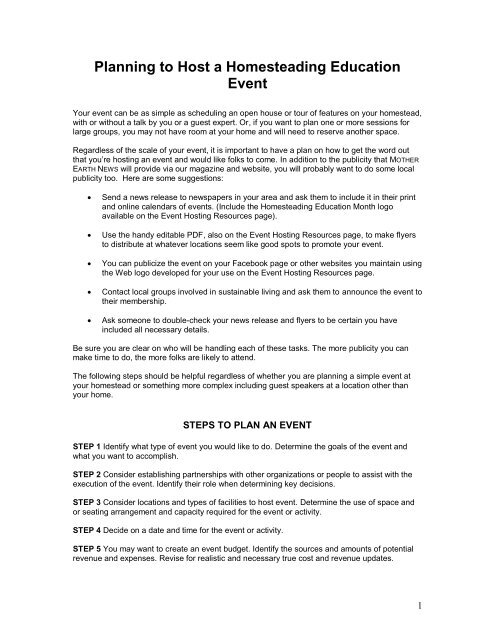Are you eager to learn the ins and outs of how to host an event successfully? Look no further! In this comprehensive guide, we will delve into the art of event hosting, offering you valuable insights, tips, and strategies to ensure your event is a resounding success. Whether you are a seasoned event organizer looking to refine your skills or a newbie venturing into the world of event planning, this guide has got you covered. From selecting the perfect venue to crafting a detailed schedule and managing logistics, we will equip you with the knowledge and tools needed to host a memorable and seamless event. Get ready to elevate your event hosting game with our ultimate guide!
Understanding the Importance of Event Hosting
Event hosting is a crucial aspect of any successful gathering, whether it’s a small business meeting, a corporate conference, or a large-scale public event. Effective event hosting can determine the overall outcome and success of the occasion. By properly planning and executing the event, hosts can create a memorable experience for attendees, strengthen relationships, and promote their brand or cause effectively.
The Benefits of Professional Event Hosting
Professional event hosting offers numerous benefits, including maintaining the flow of the event, ensuring all aspects are well-coordinated, and creating a positive impression on guests. Additionally, a skilled event host can adapt to unforeseen circumstances, handle different personalities, and keep attendees engaged throughout the event.
When attendees have a seamless experience, they are more likely to remember the event positively and may even become advocates for your brand, leading to increased visibility and networking opportunities.

Setting a Clear Event Hosting Goal
Before diving into the logistics of hosting an event, it’s crucial to set a clear goal. Whether it’s to increase brand awareness, generate leads, or foster community engagement, defining your objective will guide all your event planning decisions.
Understanding Audience Expectations
Start by identifying the needs and expectations of your target audience. By knowing what they are looking to gain from attending your event, you can tailor the experience to meet their desires.
Consider creating personas that represent your typical attendees to gain insights into their preferences and interests.
Setting S.M.A.R.T. Objectives
Once you have a clear understanding of your audience, develop S.M.A.R.T. (Specific, Measurable, Achievable, Relevant, Time-bound) objectives for your event. This will provide a roadmap for planning and evaluating its success.
- Specific: Define precisely what you want to accomplish.
- Measurable: Set metrics to track the progress and outcomes.
- Achievable: Ensure the goals are realistic and attainable.
- Relevant: Align the objectives with your overall business or marketing strategy.
- Time-bound: Establish deadlines and timelines for completing each goal.
Choosing the Ideal Event Venue
When it comes to hosting a successful event, selecting the perfect venue plays a pivotal role. The right venue can set the tone for the entire event and enhance the overall experience for attendees. Consider the following factors to ensure you choose the ideal event venue for your next gathering:
Location and Accessibility
Ensure the venue is easily accessible to your guests, whether it’s centrally located or close to public transportation options. Accessibility and convenience are key factors that can impact attendance rates.
Amenities and Facilities
Check if the venue offers the amenities you require, such as audiovisual equipment, parking facilities, catering services, and Wi-Fi connectivity. These essential facilities can contribute to the success of your event.
- Audiovisual equipment
- Parking facilities
- Catering services
- Wi-Fi connectivity
Creating a Budget for Your Event
When it comes to hosting a successful event, creating a well-thought-out budget is essential. Planning your expenses is crucial to ensure that you don’t overspend and can deliver an event that meets your objectives.
Setting Financial Goals
Start by determining how much you are willing to spend on the event. Factor in all anticipated costs such as venue rental, catering, marketing, entertainment, and any additional expenses.
Identify your key priorities for the event. Allocate a larger portion of your budget to elements that are most important to the success of your event.
Tracking Expenses
Keep a detailed record of all expenses incurred during the planning process. This helps you stay within your budget and allows for adjustments if needed.
- Utilize budgeting tools or software to track expenses efficiently.
- Regularly review your budget to ensure that you are on track with your spending.
- Consider creating a contingency fund to cover any unforeseen expenses that may arise.

Planning the Event Schedule and Timeline
When organizing an event, planning the schedule and timeline is crucial to ensure a smooth and successful execution. Start by outlining the key milestones and activities that need to be completed leading up to the event date.
Determine Event Objectives
Define the purpose of the event and the goals you aim to achieve. Whether it’s a corporate meeting, conference, or social gathering, understanding the objectives will help in structuring the schedule accordingly.
Create a Detailed Timeline
Break down the event timeline into segments starting from the initial planning phase to post-event follow-up. Assign specific tasks and deadlines to team members or vendors to ensure accountability and efficiency.
Allocate Sufficient Time for Each Segment
Estimate the time required for each activity such as venue setup, registration, speaker sessions, breaks, and networking. Be realistic in your time allocations to prevent any rushed or delayed portions of the event.
Inviting Guests and Promoting Your Event
When it comes to hosting a successful event, inviting guests and promoting your event effectively are crucial steps. Here are some strategies to make sure your event is well-attended and receives the attention it deserves.
Utilize Social Media Platforms
Take advantage of the power of social media to spread the word about your event. Create engaging posts that highlight the key features of your event and encourage attendees to share with their networks. Use popular event hashtags to increase visibility and reach a wider audience.Make sure to include the latest trends in social media marketing.
Email Marketing Campaigns
Send out personalized email invitations to your target audience. Use compelling subject lines and include all relevant event details and a clear call-to-action. Segment your email list to ensure that the right people receive the right information at the right time.Personalization is key to a successful email marketing campaign.

Managing Event Logistics
When it comes to how to host an event, managing event logistics is crucial for a successful outcome. This involves coordinating all the essential elements such as venue, transportation, catering, equipment, and more.
Streamlining Venue Selection
Choosing the right venue is key. Consider factors like capacity, location, amenities, and ambiance. Utilize online platforms for venue search and booking to simplify the process.
Make sure to highlight the year-specific trends in venue preferences for a modern touch.
Efficient Transportation Management
Ensure smooth transportation logistics for attendees, speakers, and VIP guests. Arrange shuttle services, parking facilities, and clear signage for easy navigation.
Image: An illustration depicting efficient transportation for events in 2023
Ensuring a Seamless Event Flow
Hosting a successful event involves meticulous planning and smooth execution. To ensure a seamless event flow, consider the following key factors:
Establish Clear Objectives
Define the purpose of your event and set clear objectives. Determine what you aim to achieve and tailor all aspects of the event towards those goals.
Create a Detailed Timeline
Develop a comprehensive timeline that outlines every aspect of the event from start to finish. Include setup, registration, activities, breaks, and cleanup to keep everything on track.
Coordinate with Vendors and Staff
Collaborate closely with vendors and staff to ensure everyone is on the same page. Communication is key to avoid any hitches during the event.
Utilize Event Management Software
Consider using event management software to streamline registration, ticketing, and attendee management. This will help in organizing and tracking all aspects of the event efficiently.
Engage Attendees with Interactive Elements
Incorporate interactive elements such as live polls, Q&A sessions, and networking activities to keep attendees engaged throughout the event.
Frequently Asked Questions
-
- What are the key steps to host an event successfully?
- The key steps to host an event successfully include defining your event goals, setting a budget, choosing a suitable venue, creating a guest list, sending out invitations, planning the event logistics, organizing activities or entertainment, and following up with attendees after the event.
-
- How can I choose the right venue for my event?
- When choosing a venue for your event, consider factors such as the size of the venue, location, facilities available, parking options, accessibility, and the overall ambiance that aligns with the theme of your event.
-
- What are some essential tips for event decoration and setup?
- Some essential tips for event decoration and setup include creating a cohesive theme, using lighting strategically to create ambiance, incorporating branding elements, arranging furniture for flow and comfort, and adding personal touches to make the event memorable.
-
- How can I ensure smooth event registration and check-in processes?
- To ensure smooth event registration and check-in processes, consider using online registration tools, providing clear instructions to attendees, having a designated check-in area with staff or volunteers, and using technology solutions like QR codes or mobile check-in options.
-
- What are the best practices for promoting an event and increasing attendance?
- Some best practices for promoting an event and increasing attendance include utilizing social media platforms, partnering with influencers or sponsors, sending targeted email invitations, creating engaging content or teaser campaigns, and offering early bird discounts or special promotions.
Mastering the Art of How to Host an Event: Your Ultimate Guide!
In conclusion, hosting a successful event requires careful planning, attention to detail, and effective communication. By following the steps outlined in this ultimate guide, you can master the art of event hosting and create memorable experiences for your guests. Remember to set clear goals, create a detailed timeline, and consider every aspect of the event from start to finish.
Additionally, don’t forget the importance of flexibility and problem-solving skills on the day of the event. Stay organized, stay calm, and be prepared to handle any unexpected challenges that may arise. With the right mindset and preparation, you can host an event that leaves a lasting impression on all attendees.
Thank you for joining us on this event-hosting journey. Cheers to your future successful events!



